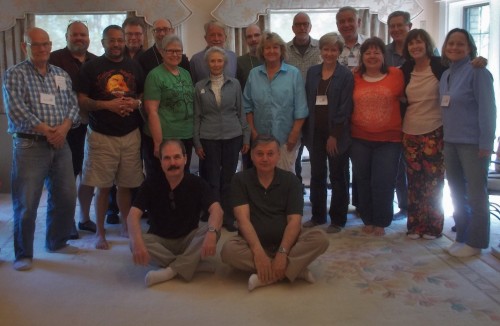In reply to a comment by Jim Austin in response to “John Dorsey Wolf — a Greater Context,” Inge Lise Karlsen chimed in from Norway to quote an old book that perhaps deserves our attention. [I checked: The book is in print.]
Inge Lise says:
….here the other day looking into the old book written by Franklin Merrell-Wolff….on the backcover is it written:
On August 7, 1936 Franklin Merrell-Wolff awakened ( with big letters ). And below is it told:
” For a hundred and one days, this process of Awakening continued. At its culmination, Merrell-Wolff had developed the ability to enter a state of infinitely expanded consciousness. Here, in PATHWAYS THROUGH SPACE, this sensitive scientist-thinker ( as many others of the time did, etc. ) gives you a coherent practical guide to reaching the spaces of higher consciousness.”
But what caught my eye, in chapter XL, page 99 in the old book:
” I recognize, in ever increasing numbers, signs of the Supreme Light.
“While there are few for whom the Sun has risen in Its full Glory, the number who have known the Twilight before the Sun appears above the horizon, or have perhaps just glimpsed the Sun as Its rays barely surmount the barrier, is much greater than I had thought.
“There is also another and more mysterious class of which members were born with the Sun above the horizon, but the Rays were obscured by a cloud-filled sky. For these, the Sun first rose in other lives, but for one reason or another They have taken incarnation under obscuration.
“The clouds may or may not break for Them during the current lifetime.
“It depends primarily upon the original purpose.
“It is sometimes necessary to drive through from below in order to force new Doors and, in such cases, the Pioneer is very apt to be one who first broke through in some other life. Sometimes the obscuration may serve the purpose of rest for The Inner Life, if the Final Rest is refused, is considerably more intense than life within the egoistic consciousness.
“Emerson is one of the known examples of such obscuration.
“The trace of the Ancient and Eternal Wisdom is to be found strongly marked in several of Emerson`s works, and the obscuration easily accounts for the atypical in this case.”
A remark:
This chapter is headlined: ” Communion in the company of the Realized,” and beginning with the praise of Spinoza, Kant, Hegel, Plato, among others, Merrell-Wolff declares: ” How greatly do They reveal to Me how much I (underlined) Know!
And the very same have I FELT by Frank`s website together with all of you folks. I have thought Merrell-Wolff sounding as a POET in the way he is describing everything. Back then the written language was far more ” colorful ” in its expression.
AND these things were written when the Nazi-Movement rising to its heights in Europe, and only 14 years back in time with the ending of WWII …. ? Franklin Merrell-Wolff also “discussing” the illusion of time but in a very “old-fashioned” manner. The language is how the youngsters of today being able in doing it (in the way of thinking back then, of the understanding living back then….. as for us not experiencing the same).
